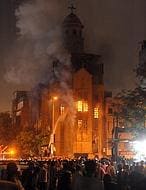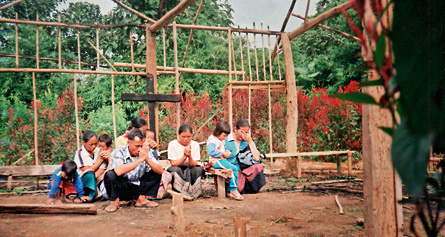
Los cristianos son perseguidos u hostigados en muchos países del mundo.
Abr. 5 (DP.net).– La persecución de cristianos se está extendiendo notablemente por todos los rincones del planeta, sobre todo en Asia, aunque hay casos muy notables en América, como está sucediendo en Nicaragua y también en México. En particular, Laos y Pakistán son escenarios donde esta persecución se está agudizando.
LAOS
En Laos, la fe Cristiana es considerada una "religión extranjera" que predica un "credo subversivo" que hay que extirpar para  conservar la "soberanía" nacional. Aunque se le considera un país budista, en realidad esa religión abarca a sólo el 65% de la población. La mayoría de ellos siguen la tradición Theravada pero, además, hay distintas ramas del budismo, algunas de las cuales incluyen prácticas sincretistas y cerca del 30% de la población siguen una mezcla del budismo con el animismo tribal (sasna phi).
conservar la "soberanía" nacional. Aunque se le considera un país budista, en realidad esa religión abarca a sólo el 65% de la población. La mayoría de ellos siguen la tradición Theravada pero, además, hay distintas ramas del budismo, algunas de las cuales incluyen prácticas sincretistas y cerca del 30% de la población siguen una mezcla del budismo con el animismo tribal (sasna phi).
Es muy difícil calcular el número de cristianos en ese ambiente sumamente represivo que sufren una mayoría de católicos, evangélicos y adventistas del séptimo día. En un país de menos de 7 millones de habitantes, se estima que hay más de 140,000 protestantes y unos 70,000 católicos, la denominación cristiana más perseguida, por lo que muchos miles han huído del país. Los adventistas suman apenas 2,000 miembros y hay unos pocos miles más de testigos de Jehováh, asambleístas de Dios. mormones, etc.
Aunque el gobierno laosiano ha prometido y asegurado en Naciones Unidas respetar la fe de los cristianos, se está desarrollando un reciente resurgimiento de los arrestos y el hostigamiento a cristianos aplicándoles cargos poco claros. Open Doors USA (Puertas Abiertas) ha informado sobre un grupo de pastores arrestados sin causa específica, sólo por llevar a cabo su ministerio, y sobre el arresto de cuatro creyentes que asistían a la misma iglesia hace unos meses, acusados de "romper la unidad de la comunidad" y de "reunir a la gente para el culto sin permiso".
- Hits: 2111

 On behalf of the United Nations Human Rights Monitoring Mission in Ukraine, I would like to welcome those present here and those joining us online.
On behalf of the United Nations Human Rights Monitoring Mission in Ukraine, I would like to welcome those present here and those joining us online.